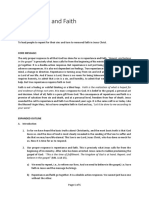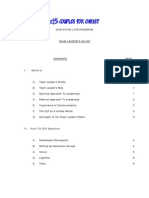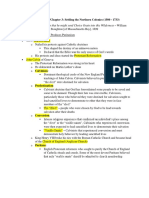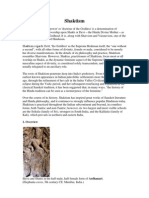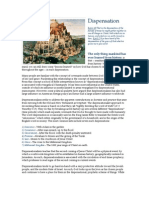CLP DiscussionGuide
Uploaded by
Gary DelantarCLP DiscussionGuide
Uploaded by
Gary DelantarChristian Life Program
Singles for Christ
GOALS, MAIN POINTS AND DISCUSSION GUIDES
A. SESSION No. 1 - GOD'S LOVE
1.
2.
3.
Goals.
a.
To help people understand that man by himself cannot solve the problems and evil in the
world, but that salvation is necessary through Jesus Christ.
b.
To present the reality of sin and Satan, the spiritual powers trying to destroy humanity.
c.
To communicate the truth that God loves us and has a plan for our welfare.
Main points.
a.
God's original and final intention for creation: the kingdom of God.
b.
The reality of sin and Satan.
c.
The victory of Christ for us over sin and Satan.
Discussion guides (see note below).
a.
Ask each individual to give a brief account of their personal history, including their Christian
background, and also why they decided to come to the CLP. This question enables you to
sound out everyone's position on Christianity, the Lord and the program.
b. "What have you thought in the past about evil and its cause, and how does that
compare with the Christian view of evil expressed in the talk?"
NOTE: A discussion starter has already been provided in the participant's handout. These discussion
guides are given for your optional use. They may be in addition to or in lieu of the discussion
starter. Use your own judgment, considering where your group members are, or what you are
more comfortable with.
B. SESSION No. 2 - WHO IS JESUS CHRIST?
1.
2.
Goals.
a.
To stir up nominal Christians' interest in Jesus and Christianity.
b.
To cause Christians to think more about the divinity of Jesus and not just accept it as a matter
of fact.
c.
To get people to begin to pray and to read the Bible outside the CLP.
Main points.
a.
Who Jesus was historically and what he was like personally.
b. The claims he made -his authority, his relationship with God, his power to forgive
sins, his divinity.
c.
3.
The conclusion: liar, lunatic or Lord? Your choice.
Discussion guides.
a.
"How would you describe the character of Jesus the man and the claims that he made?"
b.
"Do you see that Jesus' claim to be God sets him apart from moral teachers and other religious
figures, that he can't just be another great moral teacher?"
C. SESSION No. 3 - WHAT IT MEANS TO BE A CHRISTIAN
1.
2.
3.
Goals.
a.
To dispel wrong notions about what it means to be a Christian.
b.
To inspire people to live up to the standards set by God for His people.
c.
To inspire people to want to have all God wants to give.
Main points.
a.
Misconceptions or incomplete notions about Christianity.
b.
The essence of Christianity is union with God. We become a new creation. We become
children of God.
c.
As Christians, we can trust in our Father Who provides for us. Thus we can be peaceful at all
times.
Discussion guides.
a.
Share with one another how you are experiencing concretely this new relationship with the
Father through Jesus and the difference it is beginning to make in your life.
b. "Do you believe you can live a life of peace and joy because of your trust in a loving
Father?"
D. SESSION No. 4 - REPENTANCE AND FAITH
1.
2.
Goals.
a.
To lead people to repent of sin and turn to faith in Jesus Christ.
b.
To help people to grow in expectant faith.
c.
To get people to look forward to Module Two, which would focus on how they are now to
live as true Christians.
Main points.
a.
Our response to God's love and call is repentance and faith.
b. The meaning of repentance and the simple steps to turn away from wrongdoing and
sin.
3.
c.
Faith is relying on what God has said and claiming His promises for ourselves.
d.
God promises salvation and new life in the Spirit.
Discussion guides.
a.
"What do you need to do to repent?"
b.
"What do you hope to see change in your life as you dedicate it more to God?"
E. SESSION No. 5 - THE CHRISTIAN IDEAL: LOVING GOD
1.
2.
Goals.
a.
To call idealism out of people, and have them apply their idealism to the highest ideal, loving
God.
b.
To help participants understand that loving God is an attainable ideal and that loving God is
not an option but a command.
c.
To introduce people to verbal prayers of thanksgiving and petition.
Main points.
a.
The importance of ideals and goals in our lives. The love of God as the highest and greatest
ideal.
b. What it means to love God with our whole heart, mind and strength.
c.
3.
Jesus is our model in loving God.
Discussion guides.
a.
"What are your ideals? In what ways do they motivate and drive you?" Ask the question and
give the people a minute to think, and maybe to write down their response. As they bring up
different ideals, don't shoot them down and put people on the defensive, but instead raise up
the Christian ideal and give examples from your own life.
b. "How are your life directions serving God?"
F. SESSION No. 6 - LOVING YOUR NEIGHBOR
1.
2.
Goals.
a.
To communicate a vision for right relationships among Christians, how it's humanly good,
how it helps us grow as Christians.
b.
To correct wrong notions that participants may have about love, to present what love is and to
help them apply Christian love in their lives.
c.
To suggest concrete and practical ways of loving one another.
Main points.
a.
Loving neighbor, together with loving God, form the core of Christian life.
b. God's love contrasted with world's idea of love.
3.
c.
Christian love is self-sacrificial. It is service love.
d.
All men in need of our help are our neighbors.
Discussion guides.
a.
"How have you experienced associating with Christians making a difference for you? How
could you make this more a part of your life?"
b.
"Can you see concrete ways by which you can serve others, especially those in
need?"
G. SESSION No. 7 - THE CHRISTIAN FAMILY
1.
Goals.
a. To stress the importance of the family in God's plan.
b. To give practical advice for building up a strong Christian family.
2.
3.
Main points.
a.
God's plan for families.
b.
Why God's plan is not happening in the world today.
c.
How we can make God's plan happen in our families.
Discussion guides.
a.
"How have you experienced the negative effects of the world's ways on your family?"
b.
"What areas in your family life need to change in order to conform to God's plan?"
H. SESSION No. 8 - LIFE IN THE HOLY SPIRIT
1.
Goals.
a.
To stir up expectant faith and an eager desire for a greater working of God in people's lives
through the Holy Spirit.
b. To explain the baptism in the Holy Spirit and spiritual gifts.
2.
3.
c.
To prepare people for the prayer session next week.
d.
To encourage them and to help them overcome any obstacles.
Main points.
a.
The Christian life is not just human will power, but a new heart and new life from God in the
Holy Spirit.
b.
Overview of the baptism in the Holy Spirit and spiritual gifts.
c.
Description of obstacles to receiving the baptism of the Holy Spirit and ways to overcome
them.
Discussion guides.
a.
"Have you experienced the work of the Holy Spirit? If so, how? What more can you see that
the Holy Spirit would like to do in your life?"
b.
"Do you understand what it means to be baptized in the Holy Spirit?"
c.
"Do you understand what the gift of tongues is and why such a gift is important for the life of
a Christian?"
I.
SESSION No. 9 - RECEIVING THE POWER OF THE HOLY SPIRIT
1.
Goals.
a.
To lead people to receive the baptism of the Holy Spirit and the gift of tongues.
b. To lead people to commitment of their lives to Jesus Christ.
c.
2.
To instruct them about charismatic praise and worship.
Main points.
a.
Description of the baptism in the Holy Spirit and spiritual gifts.
b.
PRAYER SESSION.
c.
A call to faithfulness to prayer and one's new life in the Holy Spirit.
J. SESSION No. 10 - GROWING IN THE SPIRIT
1.
2.
3.
Goals.
a.
To teach the basic steps toward growth and maturity for Christians and call everyone to move
ahead in their life with God.
b.
To explain the importance of Christian support.
Main points.
a.
Baptism in the Holy Spirit is just the beginning. Much growth and transformation still lie
ahead.
b.
The basic tools to growth in the Christian life are prayer, study, fellowship and service. Also
sacraments for Catholics.
Discussion guides.
a.
"How are you coming along in your personal prayer time and daily reading of the Bible?"
b.
"How have you enjoyed our time and discussions together as a group?"
c.
"Do you see the need for regular fellowship with other committed Christians?"
K. SESSION No. 11 CHRIST
1.
2.
3.
THE LIFE AND MISSION OF CFC SINGLES FOR
Goals.
a.
To explain the life and mission of CFC Singles for Christ (SFC).
b.
To inspire people with the desire to be part of a committed Christian community such as SFC.
Main points.
a.
History of SFC.
b.
The SFC Statements of Mission and Philosophy.
c.
How we support one another in SFC.
d.
A invitation to be part of the life and mission of SFC.
Discussion guides.
a.
Share about the times when you found it difficult to live out your vocation as a Christian man
or woman and son or daughter.
b. "Do you see the wisdom behind the existence of a Christian community?"
L. SESSION No. 12 - TRANSFORMATION IN CHRIST
1.
2.
Goals.
a.
To encourage singles to persevere and live out actively the new life in the power of the Holy
Spirit.
b.
To excite them about becoming a part of the mission of SFC.
Main points.
a.
The end of the CLP is just the beginning of a whole new exciting life with God.
b.
God's purpose in our transformation and growth is to raise up families in the Holy Spirit that
will renew the face of the earth.
c.
We all need to grow in personal holiness, build strong Christian families and homes, and
pursue our work of global evangelization.
d.
DEDICATION CEREMONY.
You might also like
- CLS Training - TALK 1 - Evangelization and Spiritual Warfare100% (1)CLS Training - TALK 1 - Evangelization and Spiritual Warfare38 pages
- Talk No. 1: Being A Servant: House Hold Leaders TrainingNo ratings yetTalk No. 1: Being A Servant: House Hold Leaders Training11 pages
- Were New Testament House Churches Multi SiteNo ratings yetWere New Testament House Churches Multi Site34 pages
- Tivemuw Chaos Magick For Beginners PDF BijubiruNo ratings yetTivemuw Chaos Magick For Beginners PDF Bijubiru3 pages
- CLP v2 Session 7 Growing in The Spirit Expanded OutlineNo ratings yetCLP v2 Session 7 Growing in The Spirit Expanded Outline8 pages
- CLP v2 Session 7 Growing in The Spirit Expanded Outline100% (1)CLP v2 Session 7 Growing in The Spirit Expanded Outline8 pages
- MER 1 - Talk 5 - Effective Communication in Marriage 3No ratings yetMER 1 - Talk 5 - Effective Communication in Marriage 348 pages
- CLP Training: Evangelism and Spiritual WarfareNo ratings yetCLP Training: Evangelism and Spiritual Warfare27 pages
- CLP v2 Session 1 God - S Love Expanded OutlineNo ratings yetCLP v2 Session 1 God - S Love Expanded Outline5 pages
- Negros Occidental CFC 2024 Planning Assessment Tool v4No ratings yetNegros Occidental CFC 2024 Planning Assessment Tool v48 pages
- 9 Chapter Teaching Family Gods Greatest GiftNo ratings yet9 Chapter Teaching Family Gods Greatest Gift4 pages
- CFC HLT Talk 3 Being Leaders of Households100% (1)CFC HLT Talk 3 Being Leaders of Households24 pages
- Marriage Enrichment Retreat (MER) 2: Taipan, Hotel Valencia Valencia, City April 26-28, 2019100% (1)Marriage Enrichment Retreat (MER) 2: Taipan, Hotel Valencia Valencia, City April 26-28, 201941 pages
- PFO Teaching - Sons and Daughters of God - Talk 1No ratings yetPFO Teaching - Sons and Daughters of God - Talk 125 pages
- CLP v2 Session 6 Empowered by The Holy Spirit Expanded Outline100% (1)CLP v2 Session 6 Empowered by The Holy Spirit Expanded Outline15 pages
- CFC Global Vision Families in The Holy Spirit Renewing The Face of The Earth Moved by The HolyNo ratings yetCFC Global Vision Families in The Holy Spirit Renewing The Face of The Earth Moved by The Holy3 pages
- Covenant Orientation Talk 1 Our Covenant in CFCNo ratings yetCovenant Orientation Talk 1 Our Covenant in CFC52 pages
- CFC Singles For Christ CLP Training OutlinesNo ratings yetCFC Singles For Christ CLP Training Outlines11 pages
- Outpouring of The Holy Spirit: Pray-Over Guide (For SISTERS Prayer Team)No ratings yetOutpouring of The Holy Spirit: Pray-Over Guide (For SISTERS Prayer Team)2 pages
- November 4 Luke 16:1-8 From Him and For HimNo ratings yetNovember 4 Luke 16:1-8 From Him and For Him1 page
- Pep Talk: The Holy Spirit: Awesome Kids MinistryNo ratings yetPep Talk: The Holy Spirit: Awesome Kids Ministry1 page
- What Does It Mean To Believe by Oswald J. SmithNo ratings yetWhat Does It Mean To Believe by Oswald J. Smith5 pages
- Understanding Your Union With God (Bertie Brits)100% (2)Understanding Your Union With God (Bertie Brits)5 pages
- Biography of The Author - Ibn Abd Al-Qawiy and The Commentator - As-SaffaareeniNo ratings yetBiography of The Author - Ibn Abd Al-Qawiy and The Commentator - As-Saffaareeni3 pages
- Thi Thi Tun (-) Paying Homage To The Three RatanasNo ratings yetThi Thi Tun (-) Paying Homage To The Three Ratanas8 pages
- CLE1-Module-1-LM-Checked Mrs Melynda MiaNo ratings yetCLE1-Module-1-LM-Checked Mrs Melynda Mia10 pages
- Myths About The Vivekanand On ISLAM - Part I by Arun Shourie100% (1)Myths About The Vivekanand On ISLAM - Part I by Arun Shourie6 pages
- CLS Training - TALK 1 - Evangelization and Spiritual WarfareCLS Training - TALK 1 - Evangelization and Spiritual Warfare
- Talk No. 1: Being A Servant: House Hold Leaders TrainingTalk No. 1: Being A Servant: House Hold Leaders Training
- CLP v2 Session 7 Growing in The Spirit Expanded OutlineCLP v2 Session 7 Growing in The Spirit Expanded Outline
- CLP v2 Session 7 Growing in The Spirit Expanded OutlineCLP v2 Session 7 Growing in The Spirit Expanded Outline
- MER 1 - Talk 5 - Effective Communication in Marriage 3MER 1 - Talk 5 - Effective Communication in Marriage 3
- Negros Occidental CFC 2024 Planning Assessment Tool v4Negros Occidental CFC 2024 Planning Assessment Tool v4
- Marriage Enrichment Retreat (MER) 2: Taipan, Hotel Valencia Valencia, City April 26-28, 2019Marriage Enrichment Retreat (MER) 2: Taipan, Hotel Valencia Valencia, City April 26-28, 2019
- CLP v2 Session 6 Empowered by The Holy Spirit Expanded OutlineCLP v2 Session 6 Empowered by The Holy Spirit Expanded Outline
- CFC Global Vision Families in The Holy Spirit Renewing The Face of The Earth Moved by The HolyCFC Global Vision Families in The Holy Spirit Renewing The Face of The Earth Moved by The Holy
- Outpouring of The Holy Spirit: Pray-Over Guide (For SISTERS Prayer Team)Outpouring of The Holy Spirit: Pray-Over Guide (For SISTERS Prayer Team)
- Biography of The Author - Ibn Abd Al-Qawiy and The Commentator - As-SaffaareeniBiography of The Author - Ibn Abd Al-Qawiy and The Commentator - As-Saffaareeni
- Thi Thi Tun (-) Paying Homage To The Three RatanasThi Thi Tun (-) Paying Homage To The Three Ratanas
- Myths About The Vivekanand On ISLAM - Part I by Arun ShourieMyths About The Vivekanand On ISLAM - Part I by Arun Shourie







